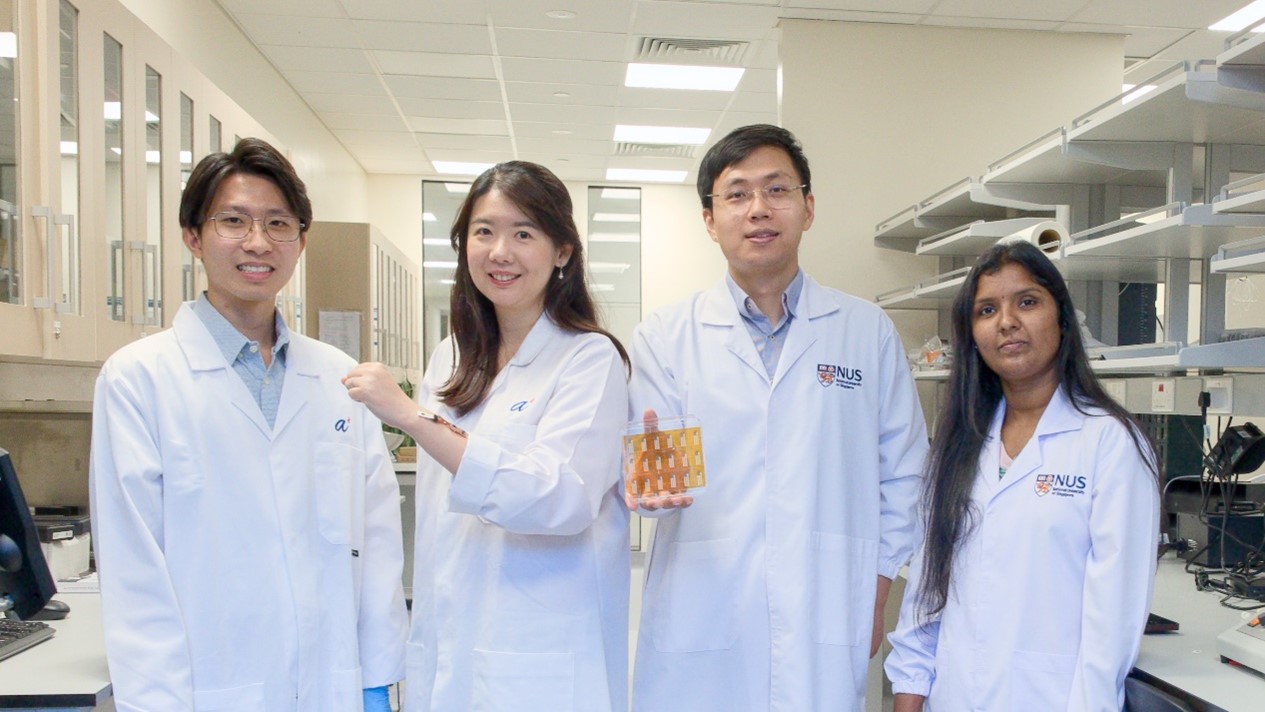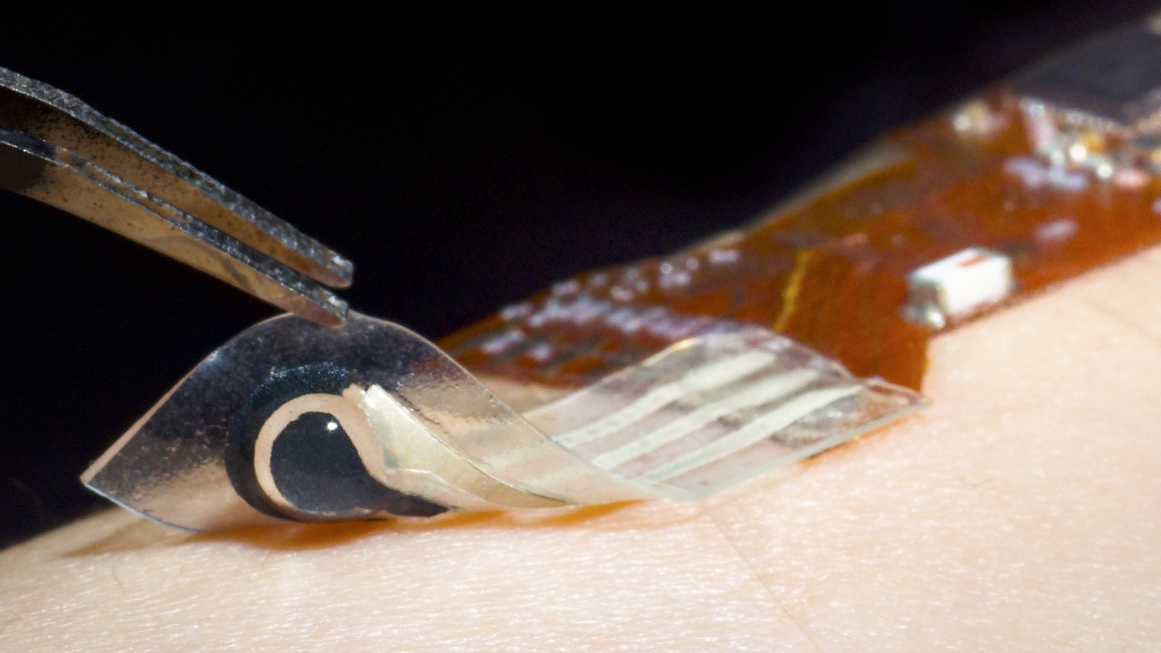IMRE NEWS
NUS and A*STAR researchers develop wearable, stretchable sensor for quick, continuous, and non-invasive detection of solid-state skin biomarkers
The novel sensor accurately measures markers such as cholesterol and lactate — crucial for the early detection of diseases
 Asst Prof LIU Yuxin (second from right) from NUS Institute for Health Innovation & Technology (iHealthtech) and Department of Biomedical Engineering under the NUS College of Design and Engineering; Dr YANG Le (second from left), Principal Scientist and Head of the Sensors and Flexible Electronics Department of A*STAR’s Institute of Materials Research and Engineering (A*STAR’s IMRE); Mr Sherwin TAN (extreme left), Research Engineer, A*STAR’s IMRE; and Ms Archana SUNDARAPANDI, Research Engineer at NUS iHealthtech, were part of the team that developed a wearable sensor that can detect biomarkers such as cholesterol and lactate directly from the skin. (Credit: NUS Institute for Health Innovation & Technology)
Asst Prof LIU Yuxin (second from right) from NUS Institute for Health Innovation & Technology (iHealthtech) and Department of Biomedical Engineering under the NUS College of Design and Engineering; Dr YANG Le (second from left), Principal Scientist and Head of the Sensors and Flexible Electronics Department of A*STAR’s Institute of Materials Research and Engineering (A*STAR’s IMRE); Mr Sherwin TAN (extreme left), Research Engineer, A*STAR’s IMRE; and Ms Archana SUNDARAPANDI, Research Engineer at NUS iHealthtech, were part of the team that developed a wearable sensor that can detect biomarkers such as cholesterol and lactate directly from the skin. (Credit: NUS Institute for Health Innovation & Technology)
SEBs offer a compelling alternative. These biomarkers, which include cholesterol and lactate, are found in the stratum corneum, the outermost layer of the skin, and have shown strong correlations with diseases such as cardiovascular disease and diabetes. However, detecting these biomarkers directly has been difficult. For instance, traditional solid electrodes lack the necessary charge transport pathways to enable electrochemical sensing of SEBs.
“Our novel hydrogel sensor technology is key to enabling the non-invasive detection of solid-state biomarkers on skin. The ionic conductive hydrogel layer that solvates the biomarkers and the electronically conductive hydrogel layer facilitates electron transport. This bilayer enables the sequential solvation, diffusion and electrochemical reaction of the biomarkers. Another highlight is the sensor’s sensitivity with biomarkers being detected precisely even in low amounts,” said Asst Prof Liu.
“This wearable sensor is the first-in-the-world that can monitor biomarkers on dry or non-sweaty skin. The sensor’s novel bilayer hydrogel electrode interacts with and detects biomarkers on our skin, allowing them to become a new class of health indicators. The stretchable design enhances comfort and accuracy as well, by adapting to our skin’s natural elasticity. This innovation can change the way we approach health and lifestyle monitoring, particularly for those living with chronic conditions requiring constant health monitoring,” said Dr Yang.
In clinical studies, the sensor demonstrated strong correlations between the biomarkers detected on the skin and those found in blood samples. This validates the sensor’s accuracy and reliability, suggesting it could be an alternative to blood tests for monitoring chronic diseases such as diabetes, hyperlipoproteinemia and cardiovascular conditions.
 The sensor comprises an ionic electronic bilayer hydrogel that can detect solid state biomarkers from the skin. The sensor is connected to a flexible printed circuit board which transmits data wirelessly to a user interface. (Credit: NUS Institute for Health Innovation & Technology)
The sensor comprises an ionic electronic bilayer hydrogel that can detect solid state biomarkers from the skin. The sensor is connected to a flexible printed circuit board which transmits data wirelessly to a user interface. (Credit: NUS Institute for Health Innovation & Technology)
The sensor’s sensitivity is another advantage, as it can detect solid-state lactate and cholesterol at very low levels. This level of sensitivity approaches that of mass spectrometry, which ensures precise monitoring of these biomarkers.
“One of the possible applications of this technology is to replace the pregnancy diabetic test, commonly known as the glucose tolerance test. Rather than subject pregnant women to multiple blood draws, our sensor could be used to track real-time sugar levels conveniently in patients’ home, with a similar level of accuracy as traditional tests. This also can be applied to diabetes in general, replacing the need for regular finger-prick test," Asst Prof Liu explained.
“Another potential application is to use the sensor in the daily monitoring of heart health, as cardiovascular disease accounts for almost one-third of deaths in Singapore. The research team has embarked on a research programme to work closely with cardiologists in establishing clinical correlation between biomarkers – lactate, cholesterol, and glucose – with heart health," said Dr Yang.
A*STAR celebrates International Women's Day

From groundbreaking discoveries to cutting-edge research, our researchers are empowering the next generation of female science, technology, engineering and mathematics (STEM) leaders.
Get inspired by our #WomeninSTEM
.png?sfvrsn=b59474e9_3)